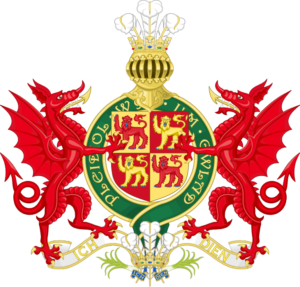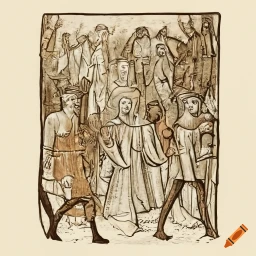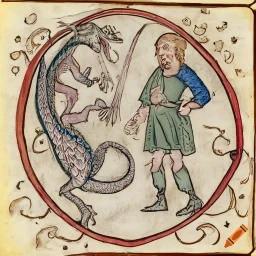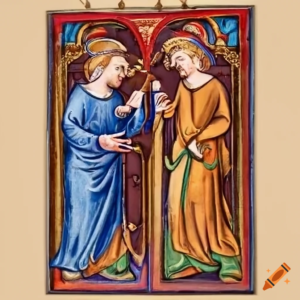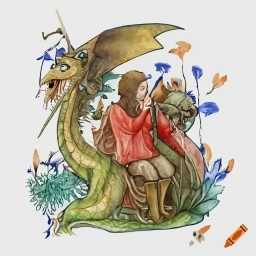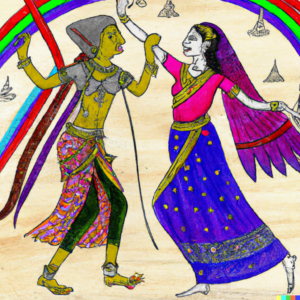The Princess Llesllie—who was Welsh, and therefore had an abundance of voiceless lateral spirants in her name—was trying to sleep; but we will get to that in a moment. Llesllie lived in one of the finest castles of all, and hence one of the draftiest, for it was provided everywhere with machicolations large enough for hurling great cauldrons of molten lead, kettles of boiling oil, or even pieces of antique furniture down onto the enemy. Nowadays, of course, one wouldn’t think of hurling antique furniture at anyone, except perhaps under great stress, but remember that in Llesllie’s time the furniture was not yet antique, and it was heavy and solidly built, like the castle itself, and horribly uncomfortable even to sit in, let alone to have it fetch up on the crown of your head. The chairs in particular were like cruel instruments of torture, and the most comfortable of them had cushions made of hard, dry leather from some ancient race of petrified cattle, and these seemed to be filled either with great chunks of iron pyrite or an assortment of goats’ horns. No one ever said anything publicly about the chairs, because King Pwyll, Slayer of Dragons, who had designed them himself, was rather proud of them.
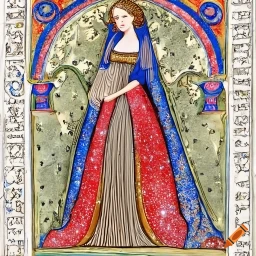
Llesllie was the younger of two sisters. Her older sister, Cllotillda, was far more beautiful than a freshly opened wild rose, shimmering with dewdrops, on a spring day so fine that all of God’s creatures swear eternal fealty to kindness and harmony, and even the ladies of the court cease their gossip for a short time. Llesllie may not have been especially clever, but she was even more beautiful than Cllotillda. This did not disturb Cllotillda, who was as kind as she was beautiful and was in any case preoccupied with a tragedy that had befallen her.
For Cllotillda, on the verge of marriage, had lost her beloved. Not exactly lost—in fact he had died. And to be strictly accurate, it was Cllotillda who had killed him. With an arrow. To state the matter thus, however, gives an unfair impression of Cllotillda, for in her kingdom it was customary for beautiful princesses to select their mate by shooting an arrow into the sky, then marrying whoever brought it back. This might seem like a romantic method of choosing a mate, but in actual practice it has its drawbacks. For one thing, some of the young men most adept at finding arrows are not at all suited to marriage. Finding an arrow requires a good pair of legs and a keen eye, whereas sitting on a throne, at least in Cllotillda’s kingdom, required buttocks of steel. And Cllotillda already rather liked a young man named Llewellyn who had a carefree laugh and a smile brighter than the gleam of sunlight reflected from a gold tooth.
Because she was fond of Llewellyn, Cllotillda sought to ensure that he would get to the arrow first. She aimed very close to him, but she misjudged and drove the arrow deep into his neck. Even so, Llewellyn would probably have survived, but a great pack of lovesick young men stormed over and fought to get the arrow, which, when pulled out, neatly sliced open Llewellyn’s left carotid artery. There was a great deal of to-do over this. A dreadful young man named Lleonard ended up with the lion’s share of the arrow, but when he attempted to claim Cllotillda as his bride, he was accused of murdering Llewellyn and was forced to withdraw his claim. Either that or be remanded to the dungeon, a horrid place furnished with ancient chairs from the castle—chairs that creaked and shifted and lurched and grated against your vertebrae in unexpected ways. Strong men turned pale and rubbed their backs when anyone even mentioned the dungeon.
Llesllie was trying to sleep because she knew that tomorrow would be a busy day—the day when she herself would find a mate by shooting an arrow into the sky. A handsome young man named Lloyd was much on her mind. But sleep was long in coming. For one thing, drafts of cold air nuzzled at her neck like a pack of excited foxhounds with wet noses; for another, Cllotillda was giving her advice.
“Don’t make my mistake,” she said. “The young men all crowd around whoever they think you like, figuring that you’ll shoot the arrow over near him. Everyone knew about me and Llewellyn, so they crowded around him. That’s why I shot too close.”
“Too close by half!” said Llesllie, who could hardly keep her eyes open. “You pierced his gullet. I had no idea you could shoot an arrow like that.”
“I didn’t either, actually,” said Cllotillda, musing. “If I had, I would probably have skewered that little toad Lleonard with an arrow.”
“Perhaps I will be lucky tomorrow,” said Llesllie.
“And get somebody nice like Lloyd?” said Cllotillda.
“No, skewer Lleonard with an arrow.”
She fell asleep while the antic breezes joyfully played around her neck and shoulders, wafting golden strands of hair this way and that.
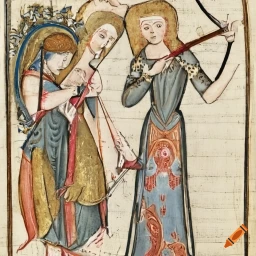
In the middle of the night Cllotillda woke Llesllie up again.
“What is it now?”
“Aren’t you worried about tomorrow?” Cllotillda asked.
“No,” said Llesllie firmly. “I have a plan.”
“I had a plan too,” said Cllotillda a bit sadly. “Mine didn’t work.”
“Poor love,” said Llesllie sleepily, and she squeezed Cllotillda’s hand and touched her brow gently and tucked a soft pillow against the back of her sister’s neck. But to herself she said, Mine will work.
It was an excellent plan, Llesllie’s, and it had a contingency clause built into it to cover every eventuality. For some time, Llesllie had been staying clear of Lloyd in public, and a few days previous she had staged a sharp and unpleasant dispute with him over the quality of the furnishings in the castle.
“I merely said that the chairs were uncomfortable,” said Lloyd.
“Perhaps you would care to tell that to my father.”
“One could get used to them,” said Lloyd, turning slightly pale.
“I’m quite sure you won’t have that opportunity,” said Llesllie and stalked away haughtily.
The castle was abuzz over this dispute. King Pwyll, Slayer of Dragons, was already in a bad mood, for he suffered from sleeplessness, and in his latest attempt to overcome this he had had a new bed designed, a beautiful bed with the history of his greatest exploits carved into the wood. Little oaken dragons, erupting from the headboard, jabbed him when he went to bed and, if he did happen to get to sleep, pursued him relentlessly in his dreams. So now he cast cold looks toward young Lloyd, who, feigning bitter hauteur, refused that night to sleep on one of the King’s beds and slept instead on the hard granodiorite floor of one of the towers. It was the first good night’s sleep he had had in some time, but there was a terrible draft. By morning his throat felt as if someone with rough and calloused fingers had peeled it like an orange, and his nose, stuffed like a fattened goose, gave out mournful honking noises when he sniffled.
The next morning, when Llesllie was to choose her mate, out in a clearing separating the forest from an especially dank and horrid swamp, Lloyd didn’t join the crowds of eager young men lined up to chase after the arrow. Llesllie felt a little secret glow of accomplishment as she saw her beloved slouching against the bole of a large English walnut, away from the others, dabbing at his nose. But then, even as she drew the bowstring back, she saw with dismay that the little toad Lleonard had figured out her scheme and was lurking near the tree.
Angrily, Llesllie let go the arrow, but not toward the group of young men, not even toward the walnut tree, but rather out over the swamp. There was a dismayed gasp from the crowd of young men. Lleonard stamped his foot.
“She should have to shoot again,” said one of the young men.
“Surely they don’t expect us to crawl around among the toads and snakes and scaly lizards and poisonous bracken and deadly toadstools and vicious swamp dragons,” said another.
King Pwyll, Slayer of Dragons, seemed about to make a pronouncement, so almost everyone stopped talking and listened carefully. The only person who didn’t was a shepherd named Ollin, who had come to the castle to sell some sheepskins and now said, “I don’t think bracken is poisonous.” He had just arrived and was preoccupied with wondering why Llesllie had shot an arrow into the swamp, so he was perhaps less diplomatic than he could have been.
“When I was young,” said the King, who, like a stately galleon, could not easily stop or change direction, “we had to gain a wife by going off and undergoing especially dangerous and thrilling adventures, such as killing—”
“And there’s no such thing as a swamp dragon,” said Ollin, raising his voice.
“—a swamp dragon,” said the King.
One of his courtiers whispered in his ear.
“Who said that?” asked the King loudly.
Two or three people pointed toward Ollin.
“What the devil do you mean by that?” asked the King. “I myself once killed—”
The Queen’s mouth fell open.
“—or at least overcame—”
Here the Queen laughed a merry little laugh that sounded like silver chimes making cruel fun of a pewter thundermug.
“—I chased away—I escaped from a swamp dragon as big as two barns and a goatherd’s shed.”
“King Pwyll, Shooer of Dragons,” murmured a page.
“I’ve never seen a swamp dragon,” said Ollin stubbornly. He wondered if someone shouldn’t go fetch the arrow for the young lady.
“Of course you haven’t,” said the King. “If you had, there wouldn’t be much left of you to tell about it, would there?”
“Swamp dragons!” snapped the Queen irritably. “It is always the same. Young men want to lounge about in a chair—”
“Not in one of your chairs,” muttered about two hundred people simultaneously under their breath.
“—and have their young maiden handed to them, instead of going out and earning her by chasing down an arrow.”
“Where is that blasted young fellow who doesn’t believe in swamp dragons?” bellowed King Pwyll.
“He went off into the swamp,” someone said. “Him and Lloyd.”
Among the young men, there was a great babble of confused conversation that, up close, resolved itself into a variety of excuses for not chasing the arrow into the swamp.
“I’m quite allergic to bracken,” said one young man.
“And I to swamp dragons,” said another.
“We’d just be wasting our time,” said someone else. “We’d never find it.”
“It’s probably up in a tree, or stuck deep in the muck of the swamp.”
“Besides, they’ll have to have another shoot if no one finds it.”
“I’d go, but I told my parents I’d be home by evening.”
“If it weren’t for my gout, I’d be off like a flash.”
“Gout, my foot!”
“You have gout too?”
“Where’d Lleonard go, anyway?”
“I saw him go off into the woods.”
“Somebody should tell him the arrow went into the swamp.”
“Oh, I wouldn’t trouble him. If he’s not going to find the arrow anyway, it’ll be a lot easier to look for it in the woods than in the swamp.”
Llesllie’s contingency plan was quite clever, really. She had bribed the fletcher to make two identical arrows, and Lloyd had stowed one of them in a hollow oak just inside the swamp. If the other suitors flocked around him, Llesllie would shoot the arrow into the swamp, whereupon he would fetch the identical arrow from the hollow tree and claim Llesllie for his wife. It was a fine and sophisticated plan, and there was no way it could fail.
Lleonard’s contingency plan was just as clever as Llesllie’s. He too had bribed the fletcher to make him an extra arrow. After dark he had put his arrow in a hole high up on the trunk of a beech tree just inside the forest. Even now he was swarming up the trunk after the arrow.
Unfortunately, the hole was already in use by a colony of bees, and while they were sleepyheads at night, during the daytime they were hyperactive and irritable. They observed him coldly as he approached the tree; they watched with heightened emotions as he climbed up the tree; and then, when he reached for the arrow, the bees, outraged, deployed themselves in an untidy but effective formation and let him have it. Many bees died that day; many were the tales of bee heroism, of gutwrenching tragedies played out on the battleground of Lleonard’s head and shoulders. And while the bees were celebrating their victory, Lleonard waited for nightfall, when the bees would retire, and massaged the ankle he had sprained in his fall from the tree. Let us leave him there for the moment; his thoughts are bleak and unfriendly, and he does not want company.
“What are you thinking about?” asked Cllotillda.
“I’m thinking about the wedding,” said Llesllie. “My wedding gown is going to have a train so long we’ll need runners to take messages from one end to the other.”
“Don’t count your chickens before they’re hatched.”
This was the first time anyone had ever said this, and Llesllie didn’t know what it meant.
“If you counted them before they were hatched, you wouldn’t be counting chickens, would you? You’d be counting eggs. And I don’t see what counting eggs has to do with my wedding train.”
“What I really meant was, I wouldn’t make too many plans until Lloyd comes back with the arrow.”
“If that’s what you meant, why did you start talking about chickens?”
“Dear heart, do tell me more about your wedding gown.”
“You’re going the wrong way,” said Ollin to Lloyd when they had made their way into the swamp. They were knee-deep in a black muck that looked like the residue of creepy nightmares poured into melted tar, and smelled like the breath of a vulture that is sick unto death.
“You could be right,” said Lloyd, sniffling. “But I just want to check over here first.” His voice sounded as if someone was beating on it with one of King Pwyll’s cast-iron pillows. “You go on ahead.”
“I know this swamp like I know my shepherd’s crook,” Ollin said impatiently, waving that implement in the air. “I can go right to that arrow.”
“I’m sure,” said Lloyd. “Do go ahead. I just want to be thorough and cover all the ground.”
“Watch out for ‘swamp dragons’!” called out Ollin gaily and went on his way.
In truth, Ollin knew the swamp the way your tongue knows the way to a painful cavity in one of your bicuspids, because many was the time he had plunged into the swamp and roamed about trying to forget the woman he loved and could never have. Her beauty, he thought now, was like the beauty of a freshly opened wild rose, shimmering with dewdrops—but then he shook his head moodily. No wild rose in the known universe could hold a candle to her. For a few moments he pondered this expression and wondered how a rose could hold a candle at all, and what it would mean by holding it to the woman he loved. And then his tormented, lovesick brain let go of the thought and dwelt once again on the lady of his dreams. He tried to think. If not a wild rose, what was as beautiful as she was?
“Did you see how Ollin talked back to Papa?” asked Cllotillda. “He wasn’t afraid at all.”
Llesllie looked blank for a moment. “Why would anyone be afraid of papa?” She felt a sneeze coming on.
“Shepherds are so—manly!”
“Achoo!” said Llesllie. “Shepherds?” For the first time ever, she began to worry a teensy about her sister.
Perhaps a tulip? thought Ollin. He imagined a gorgeous tulip and placed it next to the beautiful Cllotillda. The tulip let out a pitiful cry, tried to cover its face in shame, then wilted and died.
Lloyd took a short-cut to get to the oak tree where he had left the arrow. The short-cut led through an especially deep pool of the black muck. The black muck, which near the surface smelled like the foul, diseased guts of a dead horse, smelled far worse than that a foot or so down, and Lloyd’s every step brought more of it to the surface. Freed from his sense of smell by his cold, he plunged cheerfully through the black muck, thinking happy thoughts of Llesllie and the little llads and llassies that would bless their marriage.
The arrow was where he had left it. There was no swarm of bees, which was a good thing, as they would have been made quite ill by the horrid miasma from the swamp muck that clung to Lloyd. As it was, a nearby polecat, asleep in his burrow, began to have a terrible dream that his nostrils were melting. His stomach, comfortably full of little mousies and shrewsies, began to pitch and yaw like a coracle bobbing about in a high wind.
“You’re sniffling,” said Cllotillda, who was arranging roses.
“I’ve caught a cold,” said Llesllie. “I must be the unluckiest woman alive—to catch a cold on the day I’m betrothed!”
“Oh, dear,” said Cllotillda. “It’s all from living in that drafty castle. If one were living in a cozy little hut on an open moor, married to a shepherd, one would probably never catch a cold.”
“A shepherd?” said Llesllie.
Cllotillda gazed at her tenderly and handed her a fragrant rose.
“I cat sbell a thig,” said Llesllie.
The arrow proved easy to find, for it was stuck in the neck of a large, bellowing swamp dragon, the last of its kind. Writhing in the mud of the swamp like a tortured earthworm, its scales glistening, the dragon, on seeing Ollin approach, drew the instant if erroneous conclusion that he was the source of its pain and gasped out some dozens of British thermal units of fiery dragon-breath at him. Ollin ducked away and stared at the creature in astonishment. The dragon’s teeth would have been much like the teeth of a crocodile, if crocodiles had teeth that big, and if the dragon’s teeth weren’t fired black and grimy like the bottom of a cooking pot, and if they hadn’t grown out in all directions, giving the dragon a slightly doltish look.
“Blast!” said Ollin.
The dragon gazed at him menacingly, little puffs of flame and smoke coming from its mouth with each breath.
At the clearing, the King and his subjects saw the black seepage of the swamp bulge suddenly, take human form, and lunge toward them, dripping a foul swill that gave off a peculiarly horrid afflatus. Several ladies of the court swooned dramatically, but no one stuck around to catch them.
“Where are you going?” cried the swamp creature. “I brought the arrow back!”
“Lloyd?” cried Llesllie. “Is it you, my sweet?”
“‘Sweet’ isn’t the word that comes to mind,” said the Queen a bit frostily. Formal ceremonies were important to her, and she was becoming impatient with the general slovenliness and lack of structure in this one.
Llesllie and Lloyd happily gazed deep into each other’s eyes. Then Lloyd handed her a long, mucky object dripping with weeds and crawling with worms and crustaceans displaced from their home and hearth. She clutched it lovingly, then held it up to the assembled multitudes, who gasped and choked with deep emotion, as they were downwind.
“How the devil—” said the King.
“She has a cold, dear,” murmured the Queen. “Pray God we catch it ourselves soon.”
“Oh, dear,” said Ollin. “I was just trying to help.”
It had taken him the better part of an hour to wedge the protruding end of the arrow in his shepherd’s crook and jerk it out of the neck of the dragon. But when the sharp tip of the arrow sliced through the dragon’s left carotid artery, it took only a minute or two for the dragon to bleed to death. The end was touching and painful: there was one last, pitiful little puff of smoke, a mournful gasp, and the last of the swamp dragons came to an end, brought down by chance and Llesllie’s arrow.
The arrow itself was rather the worse for wear, as the dragon had chewed the fletching and nock off of it. Ollin wondered if he would be held responsible for this and decided to bring the guilty party—or at least the guilty party’s head—back with him, so he decapitated the swamp dragon and, heavily burdened now, made his way back to the castle.
“It’s an animal of some sort,” said Ollin.
“Anyone can see it’s a dragon,” said King Pwyll. He sniffed the air tentatively, but Ollin had washed off the swamp muck before returning.
“I suppose it does look a bit like a dragon, viewed in the right light,” said Ollin dubiously.
Cllotillda jammed an elbow into his ribs and knocked all the breath out of him.
“How clever of you,” she said, “to have killed a dragon.”
“Huuuuuuuuuuh!” he said, trying to catch his breath, and intending to say, “Well, actually—”
“There have always been those who argue that dragons don’t even exist,” said Cllotillda, “but you have proved them wrong. My father will surely reward you handsomely.”
“Oh, that’s not at all—Huuuuuuuuuuh!”
“He would probably give you an entire kingdom, just for proving what he has maintained all his life, while scoffers doubted and made cruel fun of him.”
“A kingdom—?” said the King, and he was about to ask brusquely if she thought that kingdoms grew on trees, like quinces.
“Or even the hand of one of his daughters in marriage,” said Cllotillda quickly.
This time Ollin didn’t say anything at all. For one thing, he was within inches of the woman he loved, and there was an aura about her that made him dizzy and wiped his memory clean of what one was expected to say when offered a kingdom or a princess; for another, he’d had all the breath knocked out of him.
“Well,” said the King, as he compared the two gifts his daughter had just proposed. “I’m in quite reduced circumstances, where kingdoms are concerned, but I do have an unmarried daughter. Naturally, I had hoped—but since you did bring back an arrow, and since you did slay a dragon—” He stopped talking suddenly and frowned. “He’s a commoner, blast it!” he said to Cllotillda.
“Which would certainly make it awkward,” she murmured, “if you didn’t knight him.”
“Quite so,” said King Pwyll uncertainly. “Quite so.” He stared belligerently at the servants near him. “What is everybody standing about for? Do something with this dragon’s head.”
“What would you like done with it?” asked one of the servants carefully.
“Something!” cried the King. “Something!”
The servants scurried about, each of them doing something, and the guests set off for the castle in search of a feast.
“Where is everybody?” said Lleonard when he got back.
Ollin had things to learn about court life, but Cllotillda was eager to teach him.
“These chairs,” he said during the feast that evening, “they—WHOA!”
Cllotillda had drawn her elbow back.
“What about the chairs?” asked the King suspiciously.
“He says the chairs are nice,” said Cllotillda.
“Extraordinary, really,” said Ollin, nodding. “I’ve never felt anything like them.”
“Quite,” said the King, beaming.
In the evening, some of the other young men were a bit hostile when Ollin, in his low-key, lackadaisical way, told about the dragon.
“So then I just pulled the arrow out with my crook.”
“You just pulled an arrow out of the neck of a fire-breathing dragon,” said one of the young men. “Things like that happen to me all the time.” Then, sarcastically: “Did you see anything out of the ordinary in the swamp?
Ollin thought for a moment. Then he said, “I saw a polecat vomit.”
King Pwyll had graciously declined to inquire or speculate in the matter of the second arrow, but the third arrow—Lleonard’s—was too much of a good thing. The King convicted Lleonard of slick dealings and gravely pronounced sentence on him.
“You shall go into the nameless and dismal swamp and fight another of the dreaded swamp dragons in single combat, and you are not to return without his head.”
“That’s a bit harsh,” murmured the Queen. “After all, he did it for love of your daughter.”
“Quite,” said the King. “Quite.” He turned to Lleonard. “So either you kill a dragon or you must be locked up in the dungeon overnight.”
The men and women of the court turned pale and gasped. The next morning they gathered together and waved goodbye to Lleonard as he limped off into the swamp.
“What is that object Ollin keeps waving around?” asked King Pwyll.
“I think it’s, um, a lance,” said Cllotillda.
“We shall call him ‘Sir Lancelot,’“ said the King.
“That’s no lance,” said one of the young men. “It’s a shepherd’s crook.”
“Preposterous,” said the King. “You must be wrong. We can hardly call him Sir Crookalot.”
“I think that name has been used,” said Cllotillda.
Long experience had taught the King that it was unwise to argue with Cllotillda, but for the life of him he couldn’t remember anyone named Sir Crookalot. He gazed at her apprehensively, wondering if he was being made the butt of a joke.
It seemed best to drop the matter, so he turned to the bishop who had come to conduct the marriage ceremony.
“What name would you give my son-in-law if you knighted him?” he asked.
The bishop was not nearly so clever as King Pwyll, and he had a bit of difficulty with the question.
“I thought you wanted me to conduct a marriage.”
“I do, but I need to knight the young lad first. What name would you suggest?”
“In the church, we don’t really knight people, we make them into saints.”
“I understand that,” said the King with a slight edge to his voice. He slowed his speech down to accommodate the bishop’s pace and said, “If you were making the young man a saint, what would you call him?”
“Llan,” said the bishop.
“Llan?”
“It’s Welsh for ‘Saint.’“
“I know that, you idiot, I speak the language.”
“Llan Ollin?” said the Queen, eyeing the shepherd.
“That’s wonderful,” said Cllotillda, beaming, for in the last few moments she had conceived a terrible fear that she was going to end up married to Sir Crookalot.
Everyone agreed that the double wedding was wonderful. Llesllie’s train stretched off so far toward the horizon that the girls carrying the end complained later that they couldn’t see from where they were. Lloyd and Ollin had become fast friends; people remarked that they even looked rather alike, although actually it was just their aura of stunned incomprehension that made it seem so.
“I must be the luckiest woman alive,” said Llesllie happily.
“No,” said her new husband, with an effort at gallantry, “I am.” People giggled, and he said, “I mean, I’m the luckiest man.” He glanced at Ollin and Cllotillda and added hastily, “I didn’t mean more lucky than Ollin, of course.” For some time he wondered if this sounded as if he thought himself less lucky than Ollin.
But no one was paying much attention to what was said. It was the beauty of the two brides that people talked about; and it was the panoply, the splendor of the ritual that made it all worth crying over. Elderly women sobbed for no reason at all, while their husbands drank too much and their grandchildren ate too much cake. The King got royally drunk, and the Queen forgave him for the moment, while making a mental note to remind him of it some time in the future. An opportunity would surely arise, if she was just patient.
“Papa,” said Cllotillda one day, after the double wedding, “we have all these sheepskins.”
“Sheepskins?” said the King.
“Yes,” said Cllotillda. “Would you mind terribly if we stored them in the castle?”
“Oh, I suppose it can’t do any harm.”
Later on he complained to the Queen. “She didn’t tell me that she was going to store them in the machicolations of the towers and on the furniture.”
“The furniture is much the better for it,” said the Queen. She had curled up to take a nap on the wonderfully soft sheepskins on her throne. “And the castle is so much less drafty.”
“What if I want to hurl something down on my enemies?” asked the King querulously. “She’s even put the damned things in the dungeon. What’s the point of having a dungeon if it’s comfortable? It was different in the old days.” He felt a bulgy tickling behind his nose, as if a furry little rodent was waking up from a winter’s sleep and moving around deep in his sinuses.
“I thick I’b gettig a code,” said the King.
He leaned back against the soft sheepskins and had just time to regret the loss of the exhilarating drafts in the castle before he fell blissfully asleep. And then he went in and out of little tufts of disconnected dreams that made fully as much sense as his day-to-day life. Adorable little dragons frolicked at his feet.
Originally published in another dementia on June 15, 2011

